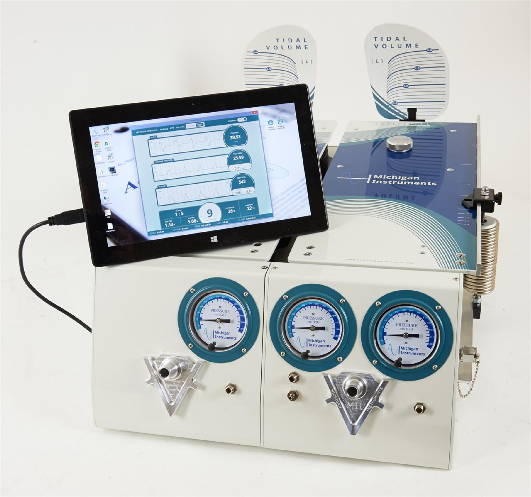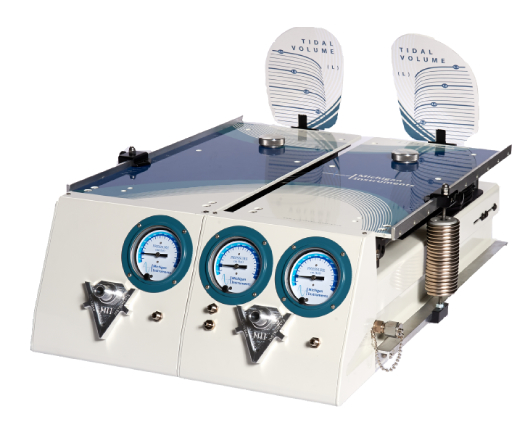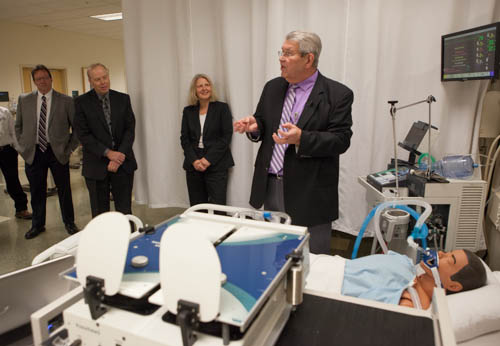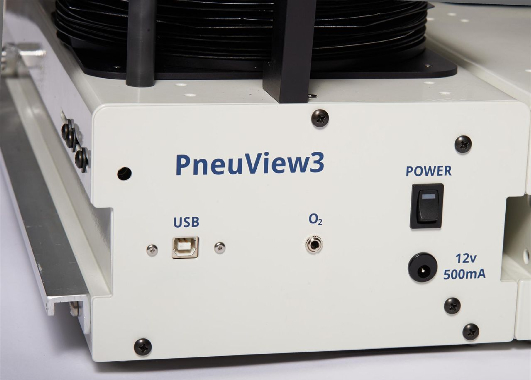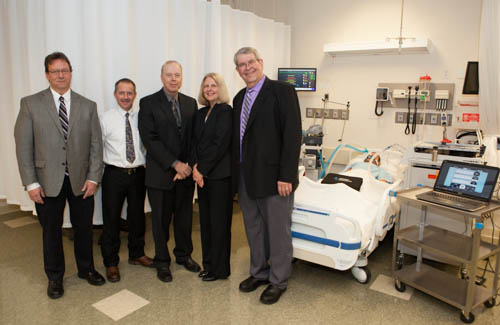Respiratory therapy students at Michigan’s Grand Valley State University in Allentown, MI and Muskegon Community College in Muskegon will soon have the opportunity to simulate proper management of life-like respiratory ailments using state-of-the-art training and test lung devices. That’s thanks to Grand Rapids-based, Michigan Instruments Inc. developers of the world-renowned “Michigan Lung” device which has announced plans to donate two of its respiratory simulation units, which normally retail for approximately $12,000 to $15,000 each, to the schools’ respiratory therapy programs. GVSU nursing and physician assistant students at will also benefit from access to the new simulation units.
The formal donation ceremony took place November 20 at Grand Valley’s Cook-DeVos Center for Health Sciences. Michigan Instruments president Joe Baldwin, commented that the units will provide students with real-time data, measurements and responses simulating those of a live respiratory patient. With this information, students learn how to properly ventilate and manage a variety of respiratory conditions.
“It is our privilege to provide the latest advancements in training and test lung products to Grand Valley State University,” Mr. Baldwin said. “Our Michigan Lung is recognized worldwide and we are fortunate to work with Grand Valley to ensure students in West Michigan are able to receive the best possible training.”
Medical software development and web firm Atomic Object was engaged by Michigan Instruments to create the cutting-edge software “Pnue View 3” for the TTL devices. Atomic Object co-founder Carl Erickson, PhD, left an academic career at Grand Valley to start Atomic Object, and many of the company’s Grand Rapids staff have degrees from Grand Valley.
“Our passion is to build great software and find better ways of doing it,” says Dr. Erickson. “We were thrilled to work with Michigan Instruments to create innovative, beautiful software, drastically improving measurement capabilities and user experience. The fact that this upgraded software will now be used to help train respiratory students at Grand Valley State University makes us all quite happy.”
PneuView development project lead Shawn Anderson noted that “Working with Michigan Instruments exemplified the great results we get by creating a team with our clients. Plus, it was a really fun project to work on.”
[adrotate group=”3″]
Allied Health Sciences Department chair Michael W. Wambach observed that this donation will be almost immediately put to use by students and faculty members in nursing, physician assistant studies, and of course respiratory therapy. “These Michigan Instruments products reproduce the movement of lungs in normal and abnormal states,” Mr. Wambach explained. “Faculty will be better able to simulate different pulmonary disease states with varying amounts of lung stiffness and changes in airway resistance to gas movement.”
The MIchigan Instruments donation will also be accessible to Grand Valley students enrolled in the Muskegon Community College respiratory therapy program, a collaborative effort between Grand Valley and MCC.
The Michigan Lung is considered to be one of the most versatile, reliable training and test lungs on the market. Its latest multifaceted, fully to-scale mechanical design and software upgrades allow for simulation of hundreds of patient scenarios. Mr. Baldwin said the software updates by Atomic Object allows for hundreds of simulated patient scenarios.
You can view a video about the Michigan Lung here:
https://www.youtube.com/watch?v=iQRf6kPCLiw#t=44
Respiratory Therapy At GVSU And MCC
The GVSU Respiratory Care Program’s mission is to prepare competent therapists with the ability to apply relevant theory along with necessary psychomotor skills and behavior consistent with effective Respiratory Care delivery. The university cites survey data from the program (2000-2004) indicating that GVSU graduates pass the National Entry-level Practitioner Examination 100 percent of the time, and the National Advanced Practitioner Examination 75 percent of the time (on the 1st attempt). Moreover, employer and graduate survey data indicates that both have a high level of satisfaction with entry and advanced preparation levels of provided by the program, which retains an average of 65% of those who enroll to graduation.
Muskegon Community College provides one level of Respiratory Care training — a 28-month Program that prepares advanced practitioners who also earn an Associate of Applied Science Degree (AAS). The program is fully accredited by the Allied Health Education Programs (http://www.caahep.org) Committee on Accreditation through (http://www.coarc.com). Class sizes typically begin with 20 to 25 students with courses sequenced beginning annually in September. Any course that is not in respiratory care, such as science or humanities may be taken prior to entry. Enrollment in the program is based on students meeting the following criteria: overall GPA of 2.0 and proficiency testing in beginning algebra and English.
Respiratory Care practitioners are well-established health care providers who work in fast-paced environments where technical and scientific responsibilities are matched by human relations proficiency. Respiratory Care therapists are typically involved in a wide range of life-supporting and life-saving activities, providing assessment, diagnosis and treatment to patients afflicted with heart and lung disorders, administering life-supporting treatments such as cardiopulmonary resuscitation, oxygen and inhaled drug therapy, and mechanical ventilation in both adult and newborn intensive care units. Job opportunities are growing and expanding dramatically in Respiratory Care.
Sources:
Michigan Instruments Inc.
The Muskegon Community College Respiratory Therapy Program
Grand Valley State University
Commission on Accreditation for Respiratory Care
Image Credits:
Grand Valley State University
Michigan Instruments Inc.

